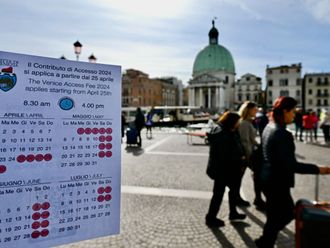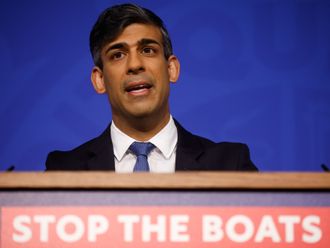Luxembourg: Eurozone ministers on Thursday neared an agreement to set the terms of Greece's departure from eight years of bailout programmes, despite splits over the degree of debt relief needed by cash-strapped Athens.
Greece is slated to exit its latest rescue on August 20 and finance ministers from the 19 countries that use the single currency are looking to send off Athens with a sustainable debt level and enough cash to reassure financial markets.
If successful the talks will mark an important milestone for Europe nearly a decade after Greece stunned the world with out-of-control debts and set the scene for three bailouts and a near collapse of the euro single currency.
"We will deliver today, I'm optimistic we will find a debt relief package that will promote sustainability in Greek debt for the future," said Portuguese Finance Minister Mario Centeno, who heads the Eurogroup.
Greece's €86-billion (Dh366 billion) programme was agreed in 2015 after six contentious months of negotiation and is set to end this summer, bringing the level of assistance received by Athens to €273 billion since 2010.
"Greece has really done the job and has delivered its commitments," said French Finance Minister Bruno Le Maire as he arrived for the talks.
As ever in the Greek debt crisis, Germany and northern eurozone states are the most resistant to debt relief and have demanded that Athens be closely tracked on reform implementation after the programme ends this summer.
Under German demands, Greece's debt relief in the short-term will be conditional on the continued implementation of reforms, which if successful could inject about €1 billion to the government's underfunded budget every year.
"We will ensure that the pressure to implement further reforms remains strong... in the medium and long term," said Austrian Finance Minister Hartwig Loger.
Opposite the hardliners are France and the European Central Bank, which argue that reduced debt is crucial in order for Greece to gain the trust of the markets.
"Nobody should lose money of course," said EU Economic Affairs Commissioner Pierre Moscovici at a news briefing in Brussels on Wednesday.
"But we should collectively find a way to alleviate the debt, either by extending the maturities of existing loans, or by buying back the most expensive ones," he said.
'Deep follow-up'
Also calling for deeper debt relief is the International Monetary Fund, whose tough-talking head, Christine Lagarde, is attending the talks.
The reform-pushing IMF played an active role in the two first Greek bailouts, but took only an observer role in the third in the belief that Greece's debt mountain was unsustainable in the long term.
A senior EU source said "it is a pity" that the IMF had forsaken participating in the third rescue but that the fund was involved on a technical level "and markets won't be shocked at all".
The conditions for Athens after the bailout will be stricter than for Portugal, Ireland and Cyprus following their respective bailouts.
"For Greece, the key concern is to not have a fourth programme or give the appearance of a fourth programme," an EU source acknowledged.
"But there are some reforms where there needs to be deep follow-up going forward," the source said.
The discussion on Greece will be followed by even more fraught talks over the future of the currency and an ambitious proposal by France for a eurozone budget, for which Paris this week won backing from German Chancellor Angela Merkel.












